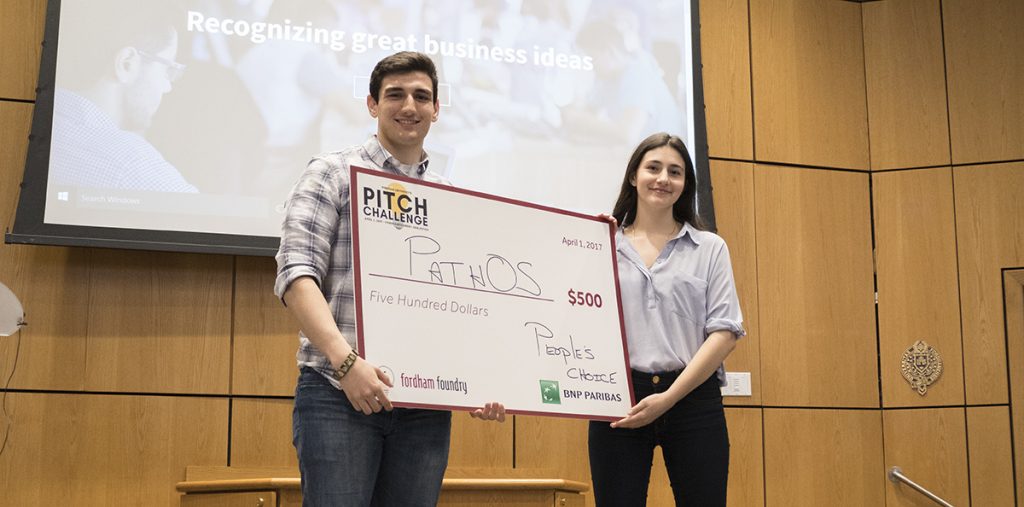The Fordham Foundry gave new meaning to the expression “elevator pitch” at its first-ever Pitch Challenge.
“In most cases, whether you’re speaking to a customer, a business partner, or an investor, they just don’t sit still for a 20-minute presentation,” said Chris Meyer, Ph.D., interim executive director of the Fordham Foundry and clinical assistant professor at the Gabelli School of Business. “So it’s important to deliver a [business]pitch efficiently and concisely.”
Sponsored by the foundry and BNP Paribas, the Pitch Challenge, which was held on April 1 at the Lincoln Center campus, gave Fordham students an opportunity to pitch their businesses and social-enterprise ideas to an accomplished panel of judges, including a number of professionals who work in startups and venture financing. Over 100 students competed for a stake in $10,000 in prize money, which was awarded among four teams delivering the top pitches. There were 41 teams of students who participated in all, and a total of 25 judges, many of who were Fordham alums.
Among the judges were:
- Lerzan Aksoy, Ph.D., associate dean of undergraduates studies at Gabelli;
- Christine Janssen, Ph.D., director of the entrepreneurship program at Gabelli;
- Samantha Batista, an associate at the Partnership Fund for New York City;
- Hervé Duteil, the managing director & CSR regional coordinator for BNP Paribas
- Chuck Pettid, an advisor/partner at Republic.co and a general partner at RainmakeME; and
- Stephen Blackwell, the chief strategy officer of Billboard Magazine.
“The judges’ input was invaluable,” said Albert Bartosic, GABELLI ’84, an entrepreneur-in-residence at the foundry, who organized the Pitch Challenge. “They hear business pitches on an ongoing basis so they have a lot of experience looking at and vetting ideas, and determining whether or not they’re viable or scalable opportunities.”
The grand prize of $4,500 was awarded to Pathos creator Anthony Parente, GABELLI ’19, and his teammates Shelda Zajmi, FCRH ’19, Ryan Zablocki, GABELLI ’17, and Samuel Knoche FCRH ’20; they were also awarded the People’s Choice prize of $500. Pathos allows Apple Watch users to create comprehensive conversation profiles of the people they meet.
Parente said the prize money would cover operational costs since the app is currently in a beta phase.
“We believe that we must act quickly to take advantage of a small window of opportunity, and that if we do so successfully, we will be able to transform and improve the way people take notes and remember their social interactions,” he said.
James Kenna, FCLC ’19, a theater major, won second place for his web service idea College Callbacks, which aims to provide high school seniors with the resources and support to confidently audition for college theater programs.
“Students’ acceptances to [theater]schools ride on the callbacks, and everyone deserves to audition feeling at their best,” he said.
The creators of KindMind, an app allowing users to track and improve their mental wellness, came in third place while Ventir, a modular backpack company, rounded out the top four winning teams.
A toolbox of resources
In the weeks leading up to the Pitch Challenge, students took part in three mentor/coaching sessions at the Rose Hill campus. The first preparatory session, which began in February, was focused on exploring the students’ ideas; the second, held in early March, provided feedback on the students’ rough pitches; and the third session, at the end of March, helped students put the finishing touches on their pitches.
Through hands-on experiences in entrepreneurship, educational programming, and mentorship opportunities led by experienced entrepreneurs like Bartosic, the foundry also seeks to promote experiential learning.
“We provide a toolbox of resources that enable students to take their business ideas as far as they would like,” he said.
The Pitch Challenge sparked participation from students of all majors in different schools across the University, including Fordham Law, the Graduate School of Arts and Sciences, Fordham Colleges at Rose Hill and Lincoln Center, and the School of Professional and Continuing Studies.
“Good ideas can come from anywhere and everywhere,” said Bartosic, who has worked in private equity, financial services, consumer products, and technology, among other industries. “In fact, some of the creativity that other students bring is really helpful to our business school students.”
Inspiring innovation and growth
Meyer said foundry events like the Pitch Challenge aim to help students develop courage and confidence in their ideas while teaching them how to think on their feet and accept criticism.
“Learning the process of creating an idea, working with people to shape it, and trying to present and persuade are right in line with our mission to help our students grow through the process of becoming innovators,” he said.
The entrepreneurial mindset that students have cultivated through the foundry has been worthwhile, particularly for non-business students, participants said.
“By developing my entrepreneurial skills I am hoping to not only supplement my skills and create more opportunities as an actor, but provide a means of sustainable longevity for my income,” said Kenna.
For Parente, the Pitch Challenge taught him that delivering a business pitch under time constraints isn’t the only thing that can make or break a startup idea.
“Ultimately, you have to make sure people can see the vision and believe that your team has what it takes to make it a reality,” he said.

